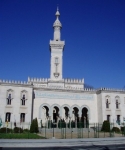31 March 2009
Alleged Money Scam Roils Islamic Center
 In the Islamic Center of Washington, beneath the 160-foot minaret that towers over Embassy Row, a tale of intrigue has simmered for years. It is marked by bitter recriminations between two men who are credited with rehabilitating its reputation as a prominent symbol of Islam in the United States.
In the Islamic Center of Washington, beneath the 160-foot minaret that towers over Embassy Row, a tale of intrigue has simmered for years. It is marked by bitter recriminations between two men who are credited with rehabilitating its reputation as a prominent symbol of Islam in the United States.
The center's business manager has been accused of stealing $430,000 from the mosque in a complicated check scam. The key witness against him is the center's director and imam, a Saudi who says he noticed the crime when he spotted too many checks being written to a gardener.
The Iranian-born business manager has a different story. He says the imam told him to take the money. About half was used to pay off debts and living expenses of two women who were close to the imam, and the rest was used to pay informants for tips about the mosque's security, he said.
It was enough to confound a jury, which deadlocked 9 to 3 after the business manager's three-week trial last May.
Now prosecutors are attempting to retry him, and the manager is firing back. He has accused the imam of committing perjury and obstructing justice. A federal judge is expected to rule in coming weeks on whether to drop the charges or prevent the imam from testifying.
Muslim community leaders say the controversy has remained mostly out of the public eye because the center, built in the 1940s by ambassadors of majority-Muslim nations, is not a typical mosque. The center enjoyed a relatively peaceful existence until the 1979 Iranian revolution, when it underwent an acidic struggle for control between the mosque's board and a dissident group of worshipers, mostly Iranians opposed to the shah of Iran.
There were protests, arrests and other clashes. The board, composed of ambassadors from Muslim nations, locked down the mosque for a time.
In 1984, hoping to put the disputes in the past, the board hired Abdullah Khouj, a professor teaching in his native Saudi Arabia, to be its director and acting imam.
That same year, the board also hired Farzad Darui, who was born in Iran but became a U.S. citizen, as its director of security. Khouj later promoted Darui to be the mosque's manager.
Khouj did not respond to interview requests made at the mosque and by telephone. Darui declined to comment.
Trial testimony and interviews with worshipers indicated that the men were dedicated to improving the mosque, which today is mostly a gathering place for the diplomatic community. It was this mosque that President George W. Bush chose to visit the day after the Sept. 11, 2001, attacks. Its Northwest Washington location, far from the large Muslim population clusters in the suburbs, draws a largely transient base of worshipers that includes commuters, students, travelers and a steady flow of taxi drivers.
Several worshipers who were approached at the mosque said they were surprised by the charges and countercharges, because the two men seemed to genuinely like and respect each other.
POSTED BY / http://www.washingtonpost.com
08:55 Posted in UNITED STATES | Permalink | Comments (0) | ![]() Facebook |
Facebook |



















The comments are closed.